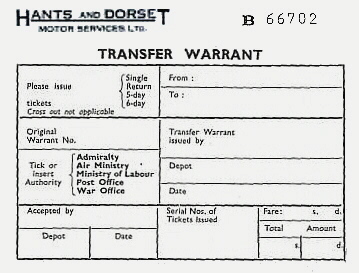|
|
|
 |
 |
|
|
 |
 |
 |
| Winter brought many problems.
Drivers and conductors might become so cold
they could barely function, but the buses
suffered too. We borrowed buses from Southern
Vectis one winter. The buses they sent over
were of course for summer services and had
no heaters. They also had twelve volt electrical
systems instead of our twenty four volts.
This meant the conductor often had to push
the bus to get it started. |
 |
| Another
problem arose at outstations. These were small
sub-depots outside the main towns with local
crews but no garage. The buses were typically
parked overnight on the site of old railway
stations. This was true of Hythe where some
of the buses were parked up right through
the weekend. Arriving at half past five on
a frosty Monday morning, the only way to get
them started was to wrap a rag round the dip
stick, soak it in diesel, set light to it
and place it in the air intake. With the valves
shut, one of the crew sat in the cab pressing
the starter while the other got ready to open
the valves as soon as the engine was warm
enough to turn over. This practice was against
the rules as it could lead to a vehicle fire
but it was the only means available. It could
also lead to a very black face, but I was
alright, I was the one in the cab! At least
at Hythe we had a hut on the site where we
could make tea and toast. Many outstations
had no facilities at all. |
 |
| The bus terminus at Hythe
was at the pier. People ignored the large
sign saying this was a bus terminal and parking
was not allowed. We would leave buses in a
position so that cars parked on the bus stand
could not get out without a struggle. Petty?
Puerile? Of course it was. Fun? You bet! |
 |
| Some journeys operated
via Eling toll bridge. At one point a dispute
arose between our company and the owners of
the bridge. The result was a ruling that passengers
had to get off the bus and walk across. On
dark nights, when the toll booth was unmanned,
we would sometimes dash across without stopping.
This could lead to trouble because somebody
living nearby often watched and would report
us. Well there were only four television channels
in those days, so maybe there really was nothing
else to watch.. |
 |
 |
 |
| We often had
to exchange travel warrents issued
to military personnel, particularly
from Marchwood. |
 |
| This involved
issuing a ticket for the bus journey
and a transfer warrant like the
one here for the rest of the journey. |
 |
| The next leg
of the journey might be by any
of the bus companies listed but
more often than not the main part
of the trip was by train. |
 |
|
|
 |
|
 |
|